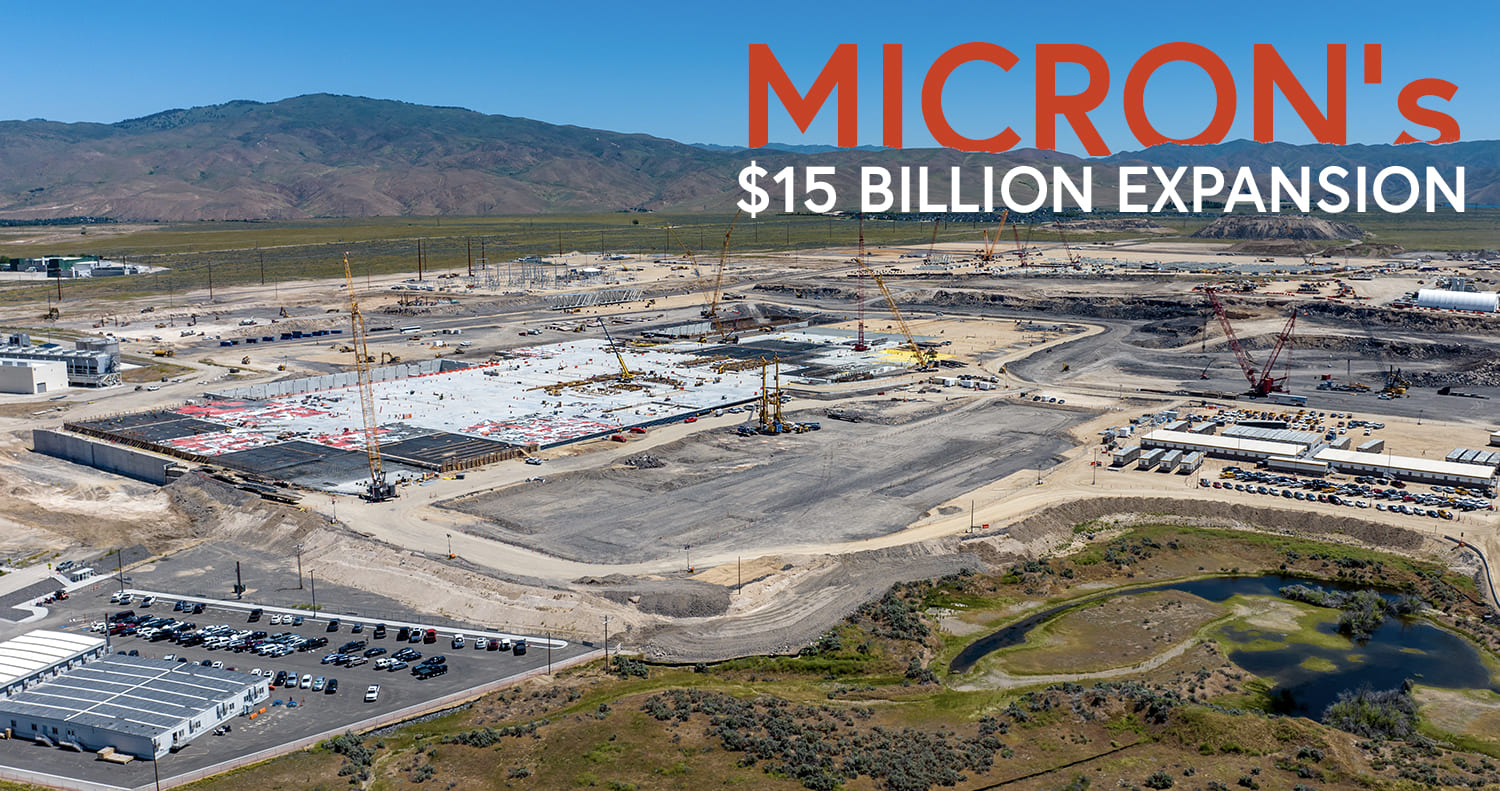Micron Technology, based in Boise, has started expanding its Boise site with a $15 billion project to build an enlarged fabrication plant and increased research and development space.
The project, which combines 8,000 tons of steel to build 15 new buildings, is the largest-ever construction project in Idaho. One of the state’s largest-ever office buildings, a 2,800-space parking garage, water treatment plant and more will support the new fab.
The new fab will expand to 12 times the size of the current facility on site, and will allow Micron to both test and develop new cutting-edge chips as well as put them into production. The Boise site will work in tandem with a new operation near Syracuse, New York that will mass-produce memory products.
There are already 11 cranes hoisting materials on site, and at full tilt, the project will employ more than 30 cranes to hoist construction materials into the air.
Micron’s stock has seen a significant run-up over the past year, more than doubling in price—in part due to a boom in demand for artificial intelligence chips. At the Boise Metro Chamber of Commerce gathering in Sun Valley earlier this spring, Scott Gatzmeier, Micron’s VP for expansion, told a crowd that each of AI chipmaker Nvidia’s leading-edge chips uses 64 Micron chips.
Read also: New York teams up with IBM, Micron for $10B semiconductor facility at Albany University
Read also: Ground breaking at Micron chip manufacturing facility, Idaho

Micron’s Boise site expansion project is set to create thousands of jobs
Micron plans state-of-the-art semiconductor manufacturing facilities that are expected to create approximately 75,000 domestic jobs over the next 20-plus years and strengthen U.S. economic and national security, furthering American innovation and competition for years to come. In Boise site expansion project, this includes 2,000 Micron jobs, 4,500 construction jobs and 15,000 indirect jobs. In New York, this includes 9,000 Micron jobs, 4,500 construction jobs and 40,000 indirect jobs. Micron’s plans will help bolster the economies and quality of life in both Idaho and New York. The two projects, as planned, will represent the single largest private investments ever made in the states of Idaho and New York.
Micron is the only company that produces memory in the U.S., the only American company capable of developing the most advanced memory, and the only company now working to bring leading-edge memory manufacturing to the U.S. Micron expects its Idaho fab and two New York fabs to help the U.S. grow its share of advanced memory manufacturing from less than 2% today to approximately 10% by calendar year 2035.
The tech giant, Micron will attract and build a semiconductor ecosystem firmly anchored on U.S. soil through its planned Idaho and New York investments and the support of suppliers in nearly all 50 states.
Micron initiated construction on its Boise fab in October of calendar year 2023. The fab will co-locate with Micron’s world-class R&D center to enhance operational efficiency, accelerate technology deployment and improve time to market for leading-edge products. Micron expects the Idaho fab to come online and become operational in calendar year 2025, with DRAM output starting in calendar year 2026 and ramping in line with market demand over the second half of the decade.
In New York, Micron is conducting preliminary design, field studies and permitting applications, including NEPA. Micron expects construction of the first fab to begin in calendar year 2025 and to come online and contribute to output in calendar year 2028, ramping in line with market demand over the next decade.
Micron’s planned co-location of R&D and manufacturing in Idaho and high-volume manufacturing in New York will help ensure U.S. leadership in memory development and manufacturing, underpinning a national supply chain and R&D ecosystem.
In addition to the Idaho and New York projects, Micron has submitted an application under the CHIPS program to the Department of Commerce to modernize its Manassas, Virginia fab for producing long-lifecycle chips to support customer demand in areas such as automotive, industrial, aerospace and defense.
Read also: How is Intel’s $20B Ohio One Chip Plant: On Track or Derailed?
